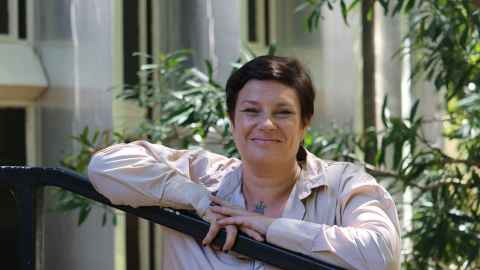Creating spiritual space
1 July 2024
Now, more than ever, we need to find opportunities for healing and reflection, says Maclaurin Chapel’s new lead chaplain.

From having fun and enjoying hobbies to taking time to rest, Reverend Petra Zaleski acknowledges we fill our spiritual cups in many ways.
So, the Maclaurin Chapel’s lead chaplain wants people to be able to use the chapel to strengthen their taha wairua, or spiritual well being, in ways that work for them.
“I’m really interested in how we transform, how we’re nourished, what renews us spiritually. However you express what spirituality is – whether it’s play, recreation, rest or renewal – for me, all of those things are spiritual principles or spiritual values.”
Petra joined the chapel at the beginning of this year and envisages it as “a sacred space of refuge where you could light a candle or just be still without it having to be a colonising experience”.
Previously vicar of St Peter’s Anglican Church in Onehunga, she gained her bachelors and a graduate diploma in theology from the University and trained towards the priesthood at Hoani Tapu te Kaikauwhau te Rongopai, St John’s Theological College. She also has a graduate diploma in addictions and mental health from AUT, and a certificate in clinical pastoral education.
I’m really interested in how we transform, how we’re nourished, what renews us
spiritually.
Her work and life experience, along with her learning about the art of spiritual direction, has led her to focus her chaplaincy work on the idea that everyone is tapu, or sacred. To foster a sense of community and connectedness, she aims to create a space at the chapel where everyone is welcome and accepted as they are.
“No one is going to convert you. We will do our best to keep you safe. Certainly, with me, who you are is safe because I believe in your intrinsic worth as a human being, breathing in and out.”
As part of the network of support services on campus, she wants to address the feelings of isolation that tauira (students) can feel at university. She empathises with young people who have experienced the stress and isolation of the pandemic so early in their lives and encourages them to see themselves as interconnected with other people, communities and their whakapapa.
“A tree, innately through the root system, will know whether another tree needs a particular nutrient. It will share its nutrients. On the surface they look like separate trees, but underneath, what can’t be seen, is the root system.
“Te ao Māori so beautifully articulates it in the call of the karanga and the honouring of the ancestors. When you think about it from a biological point of view, cellularly and genetically, our bodies are created from the same carbon material as our ancestors, so we carry that within us anyway.”
When daily life is so busy, she says creating space for healing and reflection is important.
“I think mindfulness practice is so critical – or an embodied way of being where we are in touch with our bodies and we honour our bodies, not just the body as the temple of the Holy Spirit, but actually nourishing our bodies and resting our bodies.
“I know for myself, when I’m head-down in my mahi, feeling pressured, I don’t pay a lot of attention to taking rest. The reality is, as we know from neuroscience, that when we are in peace, our creativity and our potential to attend to the work that we need to is enhanced.”
Sarah Krieg
This story first appeared in the July 2024 issue of UniNews.